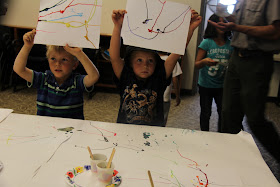The BioBlitz is a three-day event, with a 48-hour collecting period. The idea is that if you get a lot of people searching, you can find a lot in a short period of time. For this event, people came from Nevada, Utah, California, Arizona, Colorado and even the countries of Oman and Germany!
We started with a Diptera workshop, with talks about flies and how voluptuous they are.
The talks were really good. Then everyone was ready to start collecting!
Some park rangers got in on the action. All through Tuesday afternoon, people collected flies all over the park.
In the evening, Dr. Nelson gave a campfire program, which was a big hit.
He even made it interactive, asking the kids what insects they saw on this rock from the nearby creek.
Little collectors pause to see what's on the ground.
The next morning I saw Dr. Nelson collect some flies from the edge of a stream with his aspirator.
The flies came in all shapes and sizes.
That evening, volunteer Ken gave a talk about flies that included lots of interesting facts, like flies taste with their feet and smell with their hair.
Folks turned in their specimens at Baker Hall, and this family checked out what the Nevada State Entomologist had under his microscope.
A group of kids came in and they were put to work sorting the insects out of the vegetation that had all been mixed together from the netting. They were amazingly good at sorting quickly and accurately.
Several programs were part of the BioBlitz, including a kids program by Ranger Robb.
His program involved painting, but not just any kind of painting.
He's ready to unveil the surprise.
Baby flies (aka maggots) helped with the painting.
Both little kids and adult kids enjoyed the art.
Back at Baker Hall, more sorters were hard at work.
Once the insects had been sorted out of the vegetation, it was time to sort the flies from the "others."
The microscope table was put to use.
This is Bjorn, the scientist from Germany. He really knew his flies well and kept a list of all the families he had collected. He may have collected more diversity than any other individual.

At the end of the collecting period it was time for a lunch sponsored by the Great Basin National Park Foundation and raffle prizes from the Western National Parks Association. Thank you! Dr. Nelson also gave a talk about the preliminary results. Over 50 people collected thousands of flies, with about 20 families added to the park list. Wow, that's impressive!
Dr. Nelson will take the flies back to his lab and one of his students will spend most of the rest of the summer sorting out what was collected. We will find out more about the flies over the next months.
Some of the folks that collected! Everyone who participated had a great time. There was even a family who asked about next year's BioBlitz (still to be announced), as they want to plan their family reunion during the same time. It's a really fun event, so if you have a chance to be part of a BioBlitz, go for it!
























Lots of interesting pieces in this story, but I loved the art work.
ReplyDelete